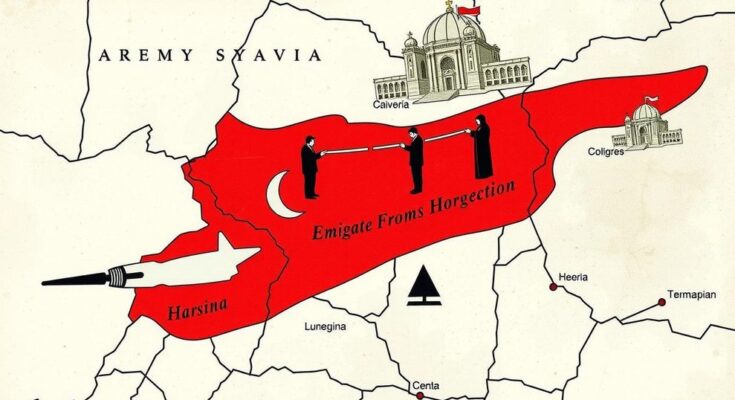Families are crossing the Syria-Lebanon border, with some returning home amidst ongoing conflict and others fleeing to Lebanon to escape instability. Personal stories, such as those of a Syrian chef and a man searching for his brother, highlight the complicated realities of life post-civil war, characterized by discrimination, economic challenges, and the uncertainty of governance. While some experience cautious optimism, fears of sectarianism and violence loom over a fragile peace in the region.
At the border between Lebanon and Syria, families traverse a stark divide marked by the contrasting signs of both nations. While some seek refuge in Lebanon, others are compelled to return to Syria, often influenced by dire circumstances at home. This article chronicles the experiences of individuals navigating this precarious border situation, showcasing the personal stories of a Syrian chef named Asa’ad Zain al-Deen, who fled Syria after familial tragedy, and a man named Anas Mazloum, who returned in search of his brother missing in a regime prison.
The backdrop to their journeys is a complicated socio-political landscape. Following the long and brutal Syrian civil war, families grapple with the realities of discrimination in Lebanon versus the dangers back home. Insights shared by these individuals provide a poignant picture of the ongoing struggles faced by many families affected by the conflict. Asa’ad, considering a return to Syria despite his reservations about the Islamist leadership of Hay’at Tahrir al-Sham, exemplifies the uncertainty lurking in both countries. He mused, “Maybe we’ll come back to Syria” while expressing concern over the current power dynamics.
Conversely, Mazloum’s determined quest to uncover the fate of his brother elucidates the depths of their trauma. As an unattended sadness lingers in his search, he resolutely stated, “I will search for him for the rest of my life.” While some individuals express cautious optimism over the newfound freedoms in areas once controlled by Assad’s regime, there exists a palpable fear of potential sectarian violence exacerbated by the end of that control. Many still remember the painful legacy of division and violence that has plagued Syria for over a decade.
On a broader scale, market conditions in areas previously under Assad’s influence show signs of economic relief, yet underlying tensions remain. As some locals welcomed the departure of Hezbollah forces and celebrated newfound autonomy, others retreated in fear, indicative of the fragile peace prevailing. Observations from the streets reflect a cautious hope tinged with the anxiety of a populace still beleaguered by its divided past.
Through the stories of Asa’ad, Mazloum, and countless others, the complexities of leaving and returning to Syria are poignantly laid bare. They illustrate the absence of simple answers amidst ongoing upheavals, as individuals strive for safety, stability, and the search for lost loved ones in an environment fraught with uncertainty and risk.
The ongoing conflict in Syria has led to mass displacement, prompting many families to flee to neighboring countries such as Lebanon. The Syrian civil war, which erupted in 2011, has resulted in significant human and political turmoil, deeply affecting the nation’s citizens. They now face a continuous cycle of danger, economic challenges, and discrimination in their host countries, alongside the harsh reality of returning home to an unpredictable situation governed by various factions. Recent shifts in control, especially with the rise of militant groups like Hay’at Tahrir al-Sham, create a complex backdrop for the decision to either remain in Lebanon or attempt to navigate back into Syria.
The narratives of individuals like Asa’ad Zain al-Deen and Anas Mazloum encapsulate the broader experience of those affected by the Syrian civil war. Their struggles underscore the difficult choices faced by many fleeing violence while seeking safety and stability against a backdrop of persistent socio-political unrest. The precarious balance between the desire for safety in Lebanon and the complex relationship with returning to a turbulent Syria reflects the ongoing human cost of the conflict, marking an indelible imprint on their lives.
Original Source: www.newyorker.com




